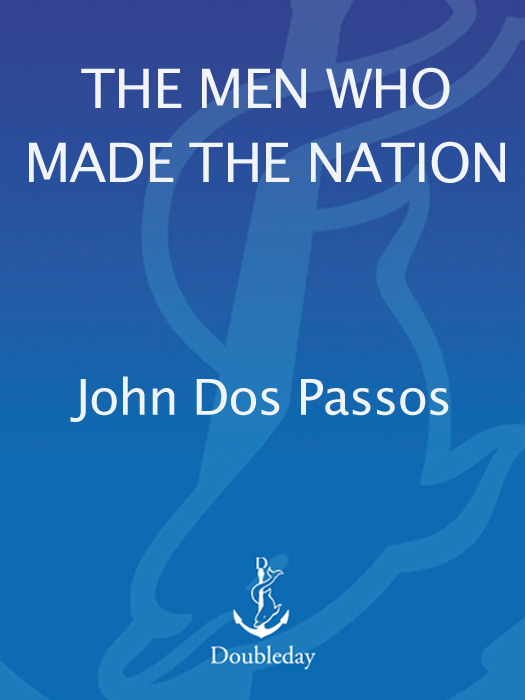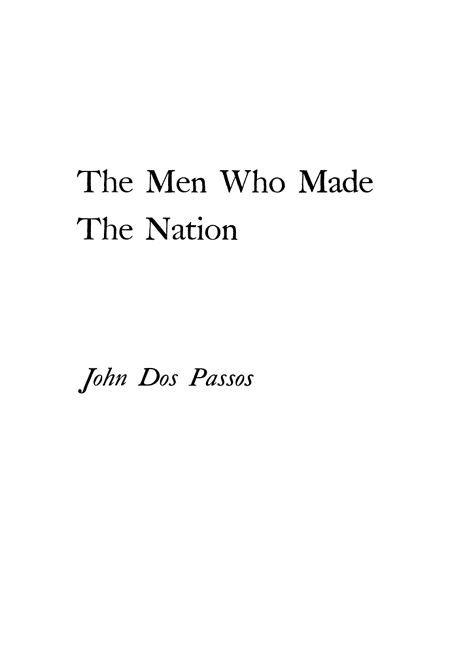Dos Passos - The Men Who Made the Nation
Here you can read online Dos Passos - The Men Who Made the Nation full text of the book (entire story) in english for free. Download pdf and epub, get meaning, cover and reviews about this ebook. City: États-Unis;Garden City;N.Y;United States, year: 2011;1957, publisher: Knopf Doubleday Publishing Group, genre: Detective and thriller. Description of the work, (preface) as well as reviews are available. Best literature library LitArk.com created for fans of good reading and offers a wide selection of genres:
Romance novel
Science fiction
Adventure
Detective
Science
History
Home and family
Prose
Art
Politics
Computer
Non-fiction
Religion
Business
Children
Humor
Choose a favorite category and find really read worthwhile books. Enjoy immersion in the world of imagination, feel the emotions of the characters or learn something new for yourself, make an fascinating discovery.

- Book:The Men Who Made the Nation
- Author:
- Publisher:Knopf Doubleday Publishing Group
- Genre:
- Year:2011;1957
- City:États-Unis;Garden City;N.Y;United States
- Rating:3 / 5
- Favourites:Add to favourites
- Your mark:
- 60
- 1
- 2
- 3
- 4
- 5
The Men Who Made the Nation: summary, description and annotation
We offer to read an annotation, description, summary or preface (depends on what the author of the book "The Men Who Made the Nation" wrote himself). If you haven't found the necessary information about the book — write in the comments, we will try to find it.
The Men Who Made the Nation — read online for free the complete book (whole text) full work
Below is the text of the book, divided by pages. System saving the place of the last page read, allows you to conveniently read the book "The Men Who Made the Nation" online for free, without having to search again every time where you left off. Put a bookmark, and you can go to the page where you finished reading at any time.
Font size:
Interval:
Bookmark:

Mainstream of America Series
EDITED BY LEWIS GANNETT



PUBLISHED BY DOUBLEDAY
a division of Random House, Inc.
All characters in this book are fictitious,
and any resemblance to actual persons,
living or dead, is purely coincidental.
Copyright 1957 by John R. Dos Passos
All rights reserved. No part of this book may be reproduced or transmitted
in any form or by any means, electronic or mechanical, including
photocopying, recording, or by any information storage and retrieval system,
without written permission from the publisher.
For information, address Doubleday, a division of Random House, Inc.
The lines from St. George Tucker, Citizen of No Mean City by Mary Haldene
Coleman are reprinted by permission of the author and The Dietz Press, Inc.
The lines from A Diary of the French Revolution by Gouverneur Morris, edited by Beatrix Davenport are reprinted by permission of Houghton Mifflin Company.
The lines from The Papers of Thomas Jefferson are reprinted by permission of Princeton University Press.
The lines from Letters of Benjamin Rush are reprinted by permission of Princeton University Press.
DOUBLEDAY and the portrayal of an anchor with a dolphin are registered trademarks of Doubleday, a division of Random House, Inc.
The Library of Congress has cataloged the hardcover edition as:
Library of Congress Catalog Card Number 57-5532
eISBN: 978-0-307-78704-0
v3.1
For
E. H. D. P.
who typed and typed
with love
I mean Politics in the great Sense, or that sublime Science which embraces for its Object the Happiness of Mankind
Gouverneur Morris to George Washington; Paris, January 24, 1790
A little after nine oclock in the morning of October 17, 1781, in the midst of the smoke and roar of the bombardment a drummer was seen beating a parley on the parapet of the hornwork that defended the most southerly corner of the British fortifications at Yorktown. Had we not seen the drummer in his red coat, young Ebenezer Denny, who had been in the trenches all night with the Pennsylvania line, wrote in his diary, he might have beat away till domesday. The constant firing was too much for the sound of a single drum.
Immediately an officer holding up a white handkerchief appeared outside the works. The drummer joined him, beating his drum. The French and American batteries ceased fire. An officer ran out from the American lines to meet the British officer and tied the handkerchief over his eyes. In the blessed silence all eyes watched the drummer boy sent back and the British officer led blindfolded through the lines to a farmhouse in the rear.
When the firing ceased noted Ensign Denny, a sharpfaced Pennsylvanian with blue eyes and rusty hair, who, although he had barely turned twenty, had already seen service for the patriot cause smuggling dispatches across the Blue Mountains; and cruised on a privateer; and stood next to Anthony Wayne when a ball took the plume off that impetuous generals hat during his rash engagement with Cornwalliss troops at Green Spring. When the firing ceased, noted Ensign Denny in his little diary, I thought I never heard a drum equal to it, the most delightful music to us all.
In the trenches the Americans were reminding each other that the seventeenth was the anniversary of Burgoynes capitulation at Saratoga.
Next day Jeffersons genial Bermuda friend St. George Tucker, who had settled in Williamsburg to study law under George Wythe and had become a Virginian and was now serving as a lieutenant colonel in Governor Nelsons militia, took up the story in his journal: At dawn of day the British gave us a serenade, with Bag-pipes I believe, and were answered by the French with the Band of the Regiment of deux ponts. As soon as the sun rose one of the most striking pictures of War was displayed which the Imagination can paint. From the point of Rock Battery on one side, our lines completely manned and our works crowded with soldiers were exhibited to view. Opposite them at a Distance of two hundred yards you were presented with a sight of the British works; their parapets crowded with officers looking at those which were at the top of our works. The Secretarys house with one of the corners broke off & many large holes through the Roof and Walls, part of which seems tottering from their weight, afforded a striking Instance of the Destruction occasioned by War.
Washington and Rochambeau had appointed Lafayettes brotherinlaw, the fashionable Viscount de Noailles, and John Laurens as commissioners to treat with the pair of Scots Cornwallis chose to represent him in the negotiations in the cozy parlor at Moores farm.
Young Laurens was the logical choice to represent the Americans. He was about the most popular officer in the army. Impulsive, full of generous sensibility, rashly courageous, he had defended his commander in chief against insult in a famous duel. He had brains too, as well as a good sword arm. He had just returned from a lightning mission to the French court to secure an immediate grant of money and munitions. He made the crossing in the company of Tom Paine on Captain Barrys swift frigate the Alliance, a crossing punctuated by a mutiny, a bolt of lightning that shivered the main topmast in a storm, the capture of numerous prizes and a desperate engagement in a dead calm with a British sloop of war and a well armed brig which ended with Barry wounded in the shoulder and both Britishers striking their colors to the Stars and Stripes.
John Laurens father, Henry Laurens, recently President of Congress, had been captured while sailing on a mission to the Dutch and was at that moment held close prisoner in the Tower of London under accusation of high treason. Everybody who read the gazettes knew that the post of Constable of the Tower was one of the plums King George awarded Lord Cornwallis when he so far forwent his original whig principles as to consent to serve against the American rebels, so that his lordships fortune was profiting at that very moment from the exorbitant charges the keepers of that most expensive of jails were levying on the wealthy Charleston merchant.
Young Laurens, too, had served in the unfortunate South Carolina campaign and capitulated with the rest when lumbering old Massachusetts Ben Lincoln surrendered Charleston. The officers and men of the forces in the Southern Department took particular satisfaction in being represented by a Charleston prisoner. When Cornwallis was forced to accept the same terms which the British had imposed on General Lincoln it was a blot wiped off their record. At Charleston the British, in a fit of whimsy, had insisted that the troops march out of town playing an American march. Smiles widened to broad grins of satisfaction among the besiegers when it was discovered that the capitulation arranged at Moores farm specified that The Garrison of York will march out to a Place to be appointed in front of the Posts at two oClock precisely with Shouldered Arms, Colors cased, and drums beating a British or German March.
Font size:
Interval:
Bookmark:
Similar books «The Men Who Made the Nation»
Look at similar books to The Men Who Made the Nation. We have selected literature similar in name and meaning in the hope of providing readers with more options to find new, interesting, not yet read works.
Discussion, reviews of the book The Men Who Made the Nation and just readers' own opinions. Leave your comments, write what you think about the work, its meaning or the main characters. Specify what exactly you liked and what you didn't like, and why you think so.










